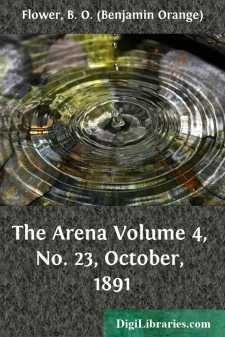Categories
- Antiques & Collectibles 13
- Architecture 36
- Art 48
- Bibles 22
- Biography & Autobiography 813
- Body, Mind & Spirit 142
- Business & Economics 28
- Children's Books 17
- Children's Fiction 14
- Computers 4
- Cooking 94
- Crafts & Hobbies 4
- Drama 346
- Education 46
- Family & Relationships 57
- Fiction 11829
- Games 19
- Gardening 17
- Health & Fitness 34
- History 1377
- House & Home 1
- Humor 147
- Juvenile Fiction 1873
- Juvenile Nonfiction 202
- Language Arts & Disciplines 88
- Law 16
- Literary Collections 686
- Literary Criticism 179
- Mathematics 13
- Medical 41
- Music 40
- Nature 179
- Non-Classifiable 1768
- Performing Arts 7
- Periodicals 1453
- Philosophy 64
- Photography 2
- Poetry 896
- Political Science 203
- Psychology 42
- Reference 154
- Religion 513
- Science 126
- Self-Help 84
- Social Science 81
- Sports & Recreation 34
- Study Aids 3
- Technology & Engineering 59
- Transportation 23
- Travel 463
- True Crime 29
The Arena Volume 4, No. 24, November, 1891
Publisher:
DigiLibraries.com
ISBN:
N/A
Language:
English
Published:
1 year ago
Downloads:
2
Categories:
*You are licensed to use downloaded books strictly for personal use. Duplication of the material is prohibited unless you have received explicit permission from the author or publisher. You may not plagiarize, redistribute, translate, host on other websites, or sell the downloaded content.
Description:
Excerpt
Manyreligious journals throughout the country have poured eulogies upon the pious head of our Postmaster General because of his raid against all letters bearing the least uncanny relation to that abhorred criminal body, the Louisiana Lottery. In one sense this action is not ill-advised; the national laws against gambling are distinct, and even if they were unjust their existence would be no excuse for their infringement. The highly moral action of Mr. Wanamaker, however, happening as it does at a time when his own relations with the hazards and plots of Wall Street have grown the talk of our entire country, teem with a suggestion that should be patent to thousands. If gnats are strained at and camels are swallowed, there is certainly a pardonable satire in congratulating those who devour the latter on their noteworthy powers of digestion. As an immoral institution the Louisiana Lottery, evil as it is, cannot be compared with Monte Carlo, which arrays itself in facile splendors of enticement and smiles in mirrors and gildings on the rash gamesters whom it ruins. But the Louisiana Lottery, which of late it has become the fashion to revile, devises its chief gains in a much less faulty manner. For such disbursements as one dollar, two dollars, five dollars, a good deal of golden expectancy and anticipation can be enjoyed, and there is no confirmed proof whatever that the citizens who are rash enough to expend these massive amounts have ever been swindled at the monthly NewOrleans drawings. Indeed, they have ample proof, if they care to sift it, that somebody in Maine, or Indiana, or California, has received a small fortune for part of a ticket purchased at the same cheap terms as their own. Naturally, unless they were complete fools, they knew previous to their investment that the chances against them were extremely large, and that their prospect of winning anything very handsome was about equal to that of their being struck by lightning or having an unknown relative leave them a fat legacy. Could it once be proved that the Louisiana Lottery is really dishonest in its dealings—really more dishonest than the bright-lit bar-room that shiningly says to one, “Come and get drunk in me if you choose, but if you don’t choose drink only as much as you want in me, and if you don’t choose to enter me at all, avoid me forever and a day”—then the iniquity of the whole organization could not be scorned in terms too harsh. But at present all indictments against this particular species of gambling would seem to be just as airy as those against the alluring tavern. The “prohibition extremists” are like lawyers who can never make their case, yet are incessantly fuming against their own failure. These extremists forget that their shadowy moral client is plaintiff in a kind of curious divorce-suit, where the defendant is human nature and the co-respondent human will. It is most probable that men will continue to get drunk just so long as education remains for them an incident force of inferior potency....





